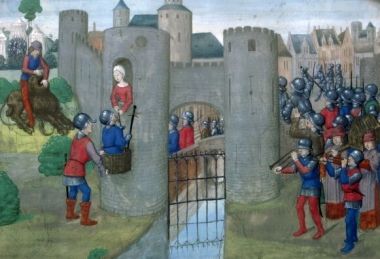How the story of Rahab reveals God's redemptive nature
Rahab the prostitute. It's as if "the prostitute" were her second name. Her identity has been recorded throughout history as a sex worker. But if you read her story in Joshua, there is much more to Rahab than may first meet the eye.

She might have been a prostitute and a Gentile, but she's also one of only five women mentioned in the geneaology of Jesus and is held up alongside Sarah – the wife of Abraham – as "faithful" in Hebrews 11.
She must have done something right.
What's her story?
As recorded in the book of Joshua (mostly chapter two), Rahab was a prostitute in the damned city of Jericho who played a pivotal role in its downfall at the hands of the Israelites.
Having heard about the God of Israel, she believed he was no ordinary Canaanite deity and chose to betray her city in order to hide two Israeli spies on the roof of her house. In return for their safety, Rahab negotiated that they would spare her and her family from the imminent destruction of the city. It was with the famous "scarlet cord" hanging out of her window that the deal was struck. God flattened the walls of Jericho, but left Rahab's house alone intact. She and her kin were spared God's wrath and she was welcomed into Israel's fold.
Rahab's actions reveal a woman of character who, although imperfect, had a fervent faith in God and who was willing to stand up to her own culture for what she believed in. So what can her story teach us?
1. God looks beyond labels and meets us where we are
Rahab's survival is significant. Prostitution would not have been highly regarded in Jericho; that means Rahab would have been poor and marginalised with no marriage prospects in a male-dominated culture.
There are two points here: Firstly, both in regards to Rahab and sex-workers more widely, we need to check our prejudice. A career in prostitution is rarely a proactive choice made from a place of freedom, but a decision made as a consequence of circumstance. Secondly, God didn't wait for Rahab to become respectable in the eyes of those around her, but used her as she was.
Where the world might look to outward appearances and judge, God is able to look beyond circumstances into the heart. His mercy is greater than we can comprehend. He is a redeemer God who is willing to meet us where we are.
2. God looks for faith not perfection
Rahab was a Gentile living in the land of Canaan. The Israelite God and his people were meant to be her "enemy". However, when she heard the stories of Yahweh she believed both in his goodness and power.
She did not see his works herself, but rumours of the God who had parted the Red Sea reached Jericho. Rahab believed them and said that Israel's God was "God in heaven above and on earth beneath" (Joshua 2.11)
Rahab was a woman of faith. She was willing to betray her own people and risk her own life and that of her family for this God that she had heard of. Like Ruth, who yoked herself with Naomi, Rahab chose to trust in the authority of Yahweh and entrust herself with his people.
Rahab was not perfect. She lied to the Kings of her nation to protect the two spies hiding with her and God's law is clear that to lie is a sin (Leviticus 19:11). However, as a woman and a Canaanite she would never have received any teaching or discipleship. God did not focus on her apparent sin, but rather Rahab's desire to serve him. The writer of Hebrews highlights this when he says: "By faith the harlot Rahab did not perish with those who did not believe, when she had received the spies with peace." (Hebrews 11:31)
It is faith and a willingness to serve that God is looking for. He is a patient, merciful God who, rather than searching for excuses to condemn, knows us intimately, and remains gracious.
3. God's mercy doesn't leave us where we are
The Rahab we leave at the end of the story is in a completely different situation from when we met her.
We met a woman who was working as a prostitute and cast out by society, but are left with a woman who has been redeemed by her faith. She marries Salmon and becomes mother to Boaz, the great grandfather of King David. This Gentile becomes a mother in the line of the Messiah.
God's character is redemptive. He does not leave Rahab in the situation he finds her, but rather meets her there and brings here out of it. Similarly, he will not leave us in the place he finds us. Her journey would not have been without its hardships; she had to leave her home town and join a new people. Choosing to follow God is not without challenge, but it is always worth it.
Rahab's personal redemption was a foretelling of the opening of salvation to all mankind in the coming of Jesus Christ. She is a strong example of how the gospel is both radically inclusive and radically transformative; meeting us where we are, but never leaving us there.
Follow Florence Taylor on Twitter: @Flo_Taylor











